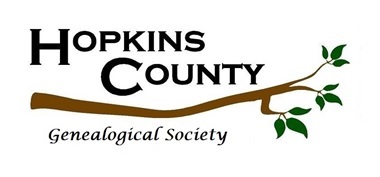 Hopkins County Genealogical Society Monthly Meeting
Hopkins County Genealogical Society Monthly Meeting
January 18, 2018
The Hopkins County Genealogical Society met on January 18, 2018 in the library at 611 N. Davis
Street at 7:01 PM. President John Sellers called the meeting to order and welcomed everyone. John
asked if everyone had read over the minutes. A motion was made and seconded to approve the
minutes as written. The motion carried.
President Sellers asked everyone to review the financial reports for November and December.
There were no questions or comments so the financial report will be filed as prepared.
With the business portion of the meeting concluded, President Sellers called on 1 st Vice President
Rhonda Bechhold to introduce the speaker, Ken Hanushek, who is on the history faculty at Paris
Junior College. He has a bachelor’s degree in history from Grove City College, a master’s in
political science from Auburn University, and a master’s in history from Texas A&M-Commerce.
His talk was on the topic, “Union Sympathizers in Texas during the Civil War Or How’d Ya Like to
‘Hang’ Out in Texas?”
Prof. Hanushek began by discussing the political climate in the United States during the years
preceding the Civil War. There were strong disagreements between the slave states in the south and
the free states in the north. A major issue arose over the admission of new states into the union. For
a while, it was decided that new states would be admitted in pairs, one free and one slave. But then
California wanted to come into the union as a free state. Congress decided that states could decide
for themselves whether to enter as free or slave states. This was called popular sovereignty.
In the presidential election of 1860, the Republican Party platform opposed the extension of slavery, not its abolition. Lincoln was the Republican candidate. When he won the election, the southern states felt that the writing was on the wall. Texas Governor Sam Houston opposed secession, and he refused to call the legislature into session to consider the issue. The secessionists called for an independent convention to consider what action Texas should take. A secession convention was held in Austin in 1861. Out of about 180 delegates, only eight opposed secession. The opponents were all from either northern counties, including Cooke County, or the hill country in the south. The delegates provided for a statewide vote in which Texans would ratify their decision. One week later, Texas voters overwhelmingly approved the Ordinance of Secession.
In 1862 the Confederacy implemented the first military draft in the history of the United States. It
offered exemptions to slaveholders with 20 or more slaves. In Cooke County, there were not many
slave owners, and most had relatively few slaves. A group of 30 men signed a petition protesting
the slaveholder exemption. They formed a “peace party” to resist Confederate authority. A spy
infiltrated some of the meetings, and he claimed that the unionists were going to seize arsenals in
Gainesville and Sherman.
A local militia arrested about 150 of the unionists and charged them with treason. A “Citizens Court,” presided over by William C. Young, was formed by the Cooke County Provost Marshal. The court conducted jury trials and found 7 men guilty in the first 7 days. They were hanged shortly thereafter. A mob formed outside the store in Gainesville where the trials were being held. They were not satisfied with the 7 hangings. The jury reconvened, and found 14 more men guilty. They were also hanged. That was still not enough for the mob. Another round of trials was held, and 19 more men were convicted and hanged.
In addition, two men were shot while
trying to escape. That means a total of 42 men were killed as a result of the trials.For many years, the people of Gainesville did not want the trial or hangings to be widely known
outside the area. In recent years, a park has been established, and a marker has been put up. In some years, there have been re-enactments of the trials, but not the hangings. Prof. Hanushek
concluded by encouraging us to study our history, warts and all. We should respect it but not ignore
the less savory parts.
President Sellers asked the speaker to pick a number between 1 and 32 for a door prize. He picked
the number 32, which corresponded to our new Treasurer, Kayla Price.
The speaker at the February 22 nd meeting will be Dawna Alsabrook. Her topic will be “The Orphan
Train.”
Those in attendance were Don Fausett, Montie Monzingo, Jan Stovall, Deanna Blair, David Blair,
Maggie Mae Sherrow, Vivian Dennis-Monzingo, Barbara Brooks, Linda Glover, Joe Glover, Ella
Brown, Jean Bell, Burke Bullock, Sue Bullock, Billie Ruth Standbridge, Ronny Glossup, Anita
Glossup, Bernie Beers, W. B. White, Jr., Rhonda Bechhold, Billy Lucas, CarolAnn Dixon, Phyllis
Brown, Marilyn Bromby, Carroll Gregg, Jerry Gregg, John A. Sellers, Pat Goggans, Steve Snyder,
Don Smith, Marilyn Smith, and Kayla Price.
The society wishes to acknowledge and thank the contributors for the following “Memorial”
donations: Jan Stovall, Land Deed Genealogy of Bedford Co, TN 1807-1852”, donated in memory
of Patricia Crowder and “Land Deed Genealogy of Lincoln co, TN 1809-1818 – Volume 1, donated
in memory of Brandi Bell Peters. Also, Linda Payne, Orphan Train Riders Volume 6 –donated in
memory of Brandi Bell Peters.
The meeting was adjourned at 7:58 PM.





